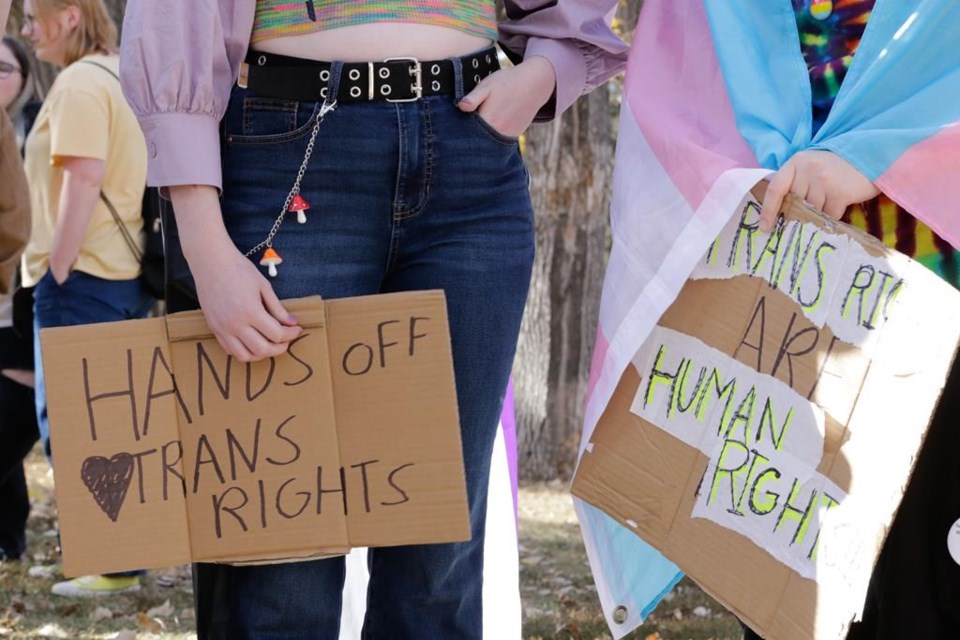REGINA — Armin Eashappie says if his teacher hadn't supported his name and pronoun change years ago, he likely wouldn't be alive.
The Grade 12 student says he told his teacher first because school was safe. He was under 16 at the time, knowing his parents wouldn't be supportive.
"It took (my parents) four years to accept me. They said that I will never be who I was to them," Eashappie told reporters Thursday, as politicians debated the province's proposed pronoun legislation
"There was a lot of crying involved, and there was a lot of fighting."
Eashappie, along with other Indigenous youth and elected leaders, visited the legislature to voice concerns over the bill, which would prevent children under 16 from changing their names or pronouns at school without parental consent.
Eashappie said he felt more confident and sure of himself when we was able to change his pronoun and name.
"I feel happier than I ever was pretending to be a girl," he said.
Tyler George, a councillor with Ochapowace First Nation near Regina, said the legislation violates people's rights to self-determination.
The bill uses the notwithstanding clause to override sections of the Charter of Rights and Freedoms and the Saskatchewan Human Rights Code.
"You're not only violating human rights, but you're violatingFirst Nations' inherent rights," George said.
"They're not consulting us. We're First Peoples here, and we have those rights and we're protected by those rights."
Meanwhile, the Saskatchewan Human Rights Commission asked the province on Thursday to reconsider the legislation.
In a letter, the commission says invoking the notwithstanding clause to override the provincial human rights code significantly affects the rights of minors.
"The 'pronoun' provisions presented to the legislature infringe upon the rights of Saskatchewan students and the commission urges the Saskatchewan government to slow down and reconsider the legislation and the effect that it may have on vulnerable youth in our province," the commission wrote, adding it's asked the province to consult with it on the bill.
"It is never too late for sober second thought."
Heather Kuttai resigned this week as one of Saskatchewan's human rights commissioners, calling the policy an attack on transgender and gender-diverse youth.
University of Saskatchewan College of Law professors also wrote to the government Thursday, saying the province is moving hastily.
"We urge the government to allow the normal legal process to take its course, and to reassure everyone that it will value and protect the constitutional and human rights of its citizens," the professors wrote.
The Saskatchewan Party government announced its pronoun policy in the summer.
Lawyers for UR Pride, a Regina LGBTQ organization, sought an injunction until a challenge could be heard in court later this year.
A judge granted the injunction at the end of September, prompting Premier Scott Moe to recall the legislature and introduce the bill. It passed second reading the legislature on Thursday.
Justice Minister Bronwyn Eyre told reporters she heard from parents in support who are scared to speak publicly.
She said a mother told her that her child went by a different pronoun and name at school without the mother's knowledge.
Eyre said social services was then called to the mother's home until it was deemed safe.
She said she doesn't think the social services call indicated the child was going to be harmed. She did not say if the mother supported the child's pronoun and name change.
"I was not in position to quiz her. I was in a position to listen," Eyre said. "The only reason that she wanted to remain confidential publicly is because she loved her child. And she didn't want to jeopardize that relationship."
Eyre said a guideline change by Regina Public Schools, where children could be called by the pronoun of their choosing, was a reason for the government to pursue the legislation.
The school division has said the education minister never asked about the change when it was announced in June 2022.
Eyre said the government has also been watching how the pronoun debate has played out in other countries.
"It is a collision of rights," she said. "Yes, children's rights are part of the conversation. So are parents' rights."
Opposition NDP education critic Matt Love told reporters there's a better way to engage parents without overriding the rights of children, citing Ontario's parental engagement office as one example.
Love said the Opposition has received hundreds of letters from constituents opposed to the bill. NDP members have been reading them in the chamber during debate.
"It's really hurtful when, as we're doing that, we're seeing members opposite watching movies," he said.
During the debate, some government legislature members have been seen chatting to each other, reading newspapers and looking at their phones with earphones in.
Eyre declined to comment on accusations her caucus was watching movies.
"I was not watching Netflix," she said.
This report by The Canadian Press was first published Oct. 19, 2023.
Jeremy Simes, The Canadian Press




